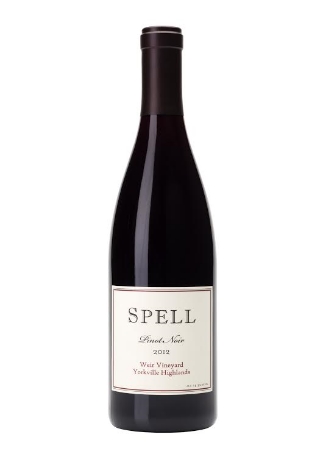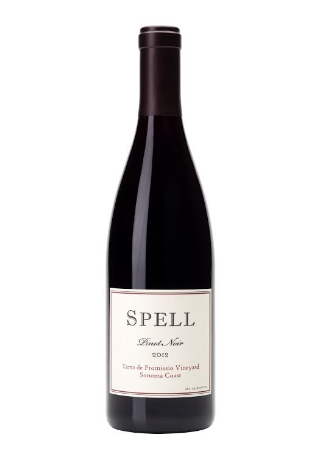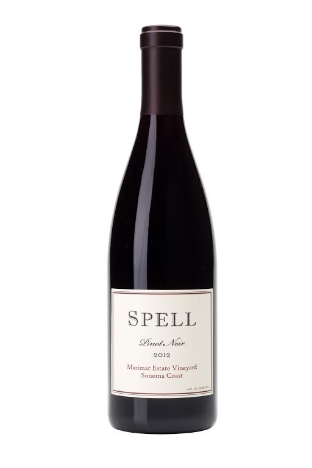"Wine Mic Monday" is a VAULT29 series based on an "open mic concept" where wineries take over our blog to write about aspects unique to them and their wines. This week, we are pleased to introduce Spell Estate and their acclaimed boutique wines from Northern Califronia. Winemaker Andrew Berge chats about the importance of soil types and the different vineyards where they source their grapes.
After many years of collecting and enjoying fine wines – with an emphasis on Pinot Noir - Bill and Tiki Spell founded Spell Winery in 2006 with the goal of producing world class Pinot Noir from Northern California. Pinot Noir when at its best captures a sense of time and place. In producing single vineyard designated wines our mission is for each wine to have a distinctive characteristic unique to each vineyard from each vintage. The current release consists of four Pinot Noirs – one blend and three single vineyards, one Chardonnay, and one Vin Gris.
One trait commonly touted by many wineries throughout the world is the soil quality their grape vines are rooted. At Spell, we believe that it may be the single most important factor in defining the distinctive character of each wine. Spell sources fruit from vineyards located as far north as Laytonville in the heart of Mendocino County and as far south as Petaluma at the southern end of Sonoma County. The (driving) distance between these two vineyards is slightly more than 125 miles. In comparison, the extremely diverse Côte d’Or in France is about 30 miles long.
The soil taxonomy of each vineyard is as varied as the geographical diversity. Soils rang from gravelly loam with moderate permeability and low water holding capacity to expanding clays with slow permeability and high water holding capacity. The vines rooted in these varied soils take up varying levels of macronutrients and micronutrients which form the foundation of vine development. The available water within the soils directly influences how and when these nutrients are delivered and consumed by the vines. The whole process of vine growth is powered by the amount of sun each vine receives.
Determining the impact that soil, water, and sun have on the composition of each grape and ultimately wine, is beyond the scope of this blog post. Trying to comprehend the complexity of the matter is captivating and will be a life-long endeavor for me.
Recently, I have been exploring the association between tannin profiles, specifically perception of tannin on the palate, and soil types. I admit it. I love tannin. They are the backbone which enables elegant demeanor and composure of flavors of every great wine. Their presence acts as an anti-oxidant which allows wines to age gracefully for years, even decades in some circumstances.
At the peak of ripeness, the Spell grapes are hand harvested in the vineyard and delivered to the winery in half-ton bins. Once at the winery they are processed and fermented separately according to vineyard, block, and clone. The protocols are the same for each lot as it is our goal to preserve the essence of each vineyard. The underlying theme is all about extraction with the goal of producing wines with excellent concentration, balance and age-ability.
Initially when we started the process of sourcing vineyards soil type was not a significant part of the discussion. Given the great distance between vineyards it is not surprising each of the Spell vineyards has a different soil type. These vineyards yield grapes that produce a wine with its own character and the soil is just one contributing factor to their tannin profile. It is a privilege to work with these growers and their fruit. Provided below is a brief description of each vineyard along with its specific tannin profile.
To learn more about Spell wines please visit www.spellwinery.com.
- Alder Springs Vineyard, owned by Stuart Bewely, is located 3 miles west of Laytonville, CA. Surrounded by rugged and undeveloped Mendocino forest the vineyard starts at an elevation of 1,700ft and climbs to over 2,000ft. The primary soil profile in our blocks consists of decomposing sandstone from an ancient sea bed. The tannin profile of this wine consists of super fine grain or dusty-powdery tannins.
- The Weir Vineyard, owned by Bill and Suki Weir, sits in the heart of the Yorkville Highlands. About 8 miles east of Boonville at an elevation of 700 to 900 ft. The Weir Vineyard consists of a conglomerate of gravely loam formed from a base of Schist. Blocky square tannins are the signature of this wine.
- In western Sonoma county, overlooking the township of Freestone lies the Dona Margarita Vineyard. Owned and farmed by Marimar Torres, the vineyard sits at an average elevation of 500 ft. The sandy loam, Goldridge soils produce a wine of intense flavor, concentration and a silky smooth, almost velvety tannin profile. These soils cover most of the Western Sonoma Coast and Russian River Valley appellations and is one factor that has made wines from this region world reknown.
- The Terra de Promissio Vineyard is in the Petaluma Gap area of Sonoma County. Owned and farmed by Diana and Charles Karren, the Terra de Promissio Vineyard has an elevation just above sea-level. The Spell block sits on the hip of the vineyard as it shifts from a western exposure to an eastern exposure. The soil profile here is a shallow clay-loam mixed with some expanding clays soils. The profile is one defined by broad shouldered tannins with a hint more bitterness than astringency.
Follow Spell Estate on Facebook, Twitter, Instagram & Pinterest!
Be sure to add your Spell experiences in the VAULT29 app!










